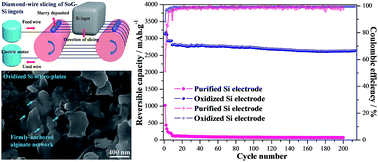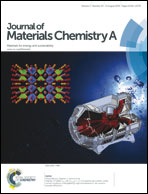Robust polymeric coating enables the stable operation of silicon micro-plate anodes recovered from photovoltaic industry waste for high-performance Li-ion batteries†
Abstract
Silicon is regarded as one of the most promising anode materials for next generation Li-ion batteries (LIBs). However, for the actual applications, a Si electrode must possess superior electrochemical properties, and the fabrication must be cost-effective and industrially scalable. Here, we report a highly scalable and low-cost route of recovering high-purity Si micro-plates from photovoltaic industry waste obtained during diamond-wire slicing of solar grade Si ingots, and demonstrate their great potential as high-performance anode materials with ideal cost. To accommodate the severe volume effect of Si micro-plates, a firmly anchored alginate coating layer is formed on the Si surface on the basis of the strong interactions between the oxidized Si and alginate carboxylic groups, which helps to construct a robust conductive network around Si micro-plates and allows the electrode architecture to be perfectly maintained even though the Si micro-plates are pulverized into nanoparticles. The recycled Si anode delivers high reversible capacity, superior rate capability and extraordinary cyclability. This new technology not only provides an abundant and low-cost Si source for LIB applications, but also effectively resolves the waste disposal issue of the photovoltaic industry, which may therefore bring about enormous environmental and economic benefits.


 Please wait while we load your content...
Please wait while we load your content...